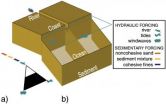(Press-News.org) A collection of 12 reviews, comprising three reflective pieces and nine research and development agendas, is published as part of a sponsored Supplement on 25 January 2011 in PLoS Medicine. This Collection highlights the outcomes of a series of consultations among more than 250 experts that were undertaken by the Malaria Eradication Research Agenda (malERA) initiative.
The introductory article by Pedro L. Alonso, CRESIB-Hospital Clínic, University of Barcelona, Barcelona, Spain and colleagues, "A Research Agenda to Underpin Malaria Eradication" sets the malERA program in context. The nine research and development agendas define the priority research areas for eight different thematic areas including basic science and enabling technologies; drugs; vaccines; vector control; health systems and operational research; modelling; diagnoses and diagnostics; and monitoring, evaluation and surveillance. An additional paper identifies research priorities that are common to several of the thematic areas.
The Collection includes an analysis from Jose Najera (formerly at the WHO, Geneva) and colleagues, of the last Global Malaria Eradication Programme (1955�) and outlines lessons for future eradication programs. A second analysis by Myron M. Levine, University of Maryland School of Medicine, Baltimore, USA and colleagues, examines the role research has played in eradication or elimination initiatives for smallpox, poliomyelitis, and measles and from this analysis derives nine cross-cutting lessons for malaria eradication.
Pedro L. Alonso comments: "As chair of the malERA Steering Committee, I am delighted to see published this R&D agenda for malaria eradication, after an intense and perhaps unprecedented consultative process that lasted two years and involved more than 250 of the leading scientists in the malaria field and beyond".
Marcel Tanner, Swiss Tropical Institute, Basel, Switzerland (co-chair of the malERA Steering Committee), adds: "I am confident that the definition of this set of key research and development priorities will contribute to paving the way for the ultimate goal of malaria elimination and eradication. Elimination and finally eradication are public health objectives we can not afford not to dream of. The research agenda we publish today shows the strong commitment felt within the research and scientific communities and complements the Global Action Plan for elimination/eradication".
The Malaria Eradication Research Agenda (malERA) initiative aimed to complement existing research agendas that are primarily aimed at reducing the global burden of morbidity and mortality due to malaria (the traditional goal of malaria control) with a set of research and development priorities that identify knowledge gaps and tools needed for worldwide eradication of malaria.
The malERA consultation process was led by a Steering Committee composed of 14 independent scientists (chaired by Pedro L. Alonso), an International Advisory Committee (chaired by Myron M. Levine) that included veterans from eradication and elimination campaigns of both malaria and other diseases, and a Leadership Council comprising Dr. Margaret Chan, Director-General of the World Health Organization, Dr. Tadataka Yamada, President of the Global Health Program of the Bill & Melinda Gates Foundation, Dr. Anthony S. Fauci, Director of the National Institute of Allergy and Infectious Diseases, Dr. Mark Walport, Director of the Wellcome Trust, and Dr. Awa Coll-Seck, Executive Director of the Roll Back Malaria Partnership Board.
INFORMATION:
The Supplement was produced with support from the Malaria Eradication Research Agenda (malERA) initiative, which was funded by a grant from the Bill & Melinda Gates Foundation. The PLoS Medicine journal editors have sole editorial responsibility for the content of this Collection.
The Supplement will be hosted on a PLoS Medicine Collection page, where all 12 articles can be accessed: www.ploscollections.org/malERA2011
Introductory Article by Pedro Alonso and Colleagues: 'A Research Agenda to Underpin Malaria Eradication'
Funding: malERA received a grant from the Bill & Melinda Gates Foundation. The funders had no role in study design, data collection and analysis, decision to publish, or preparation of the manuscript.
Competing Interests: GB declares that he is Chair of MALVAC, Chair USAID Malaria Vaccine Development Program Scientific Consultants Group, a member of the Board of Roll Back Malaria, and a member of the APMEN Advisory Board.
Citation: Alonso PL, Brown G, Arevalo-Herrera M, Binka F, Chitnis C, et al. (2011) A Research Agenda to Underpin Malaria Eradication. PLoS Med 8(1): e1000406.doi:10.1371/journal.pmed.1000406
IN YOUR COVERAGE PLEASE USE THIS URL TO PROVIDE ACCESS TO THE FREELY AVAILABLE PAPER: http://www.plosmedicine.org/article/info%3Adoi%2F10.1371%2Fjournal.pmed.1000406
PRESS-ONLY PREVIEW OF THE ARTICLE: www.plos.org/press/plme-08-01-malERaintro.pdf
PRESS CONTACTS FOR THE malERA SUPPLEMENT:
Katie Hickling
press@plos.org
Matiana González
matiana.gonzalez@cresib.cat
About PLoS Medicine
PLoS Medicine is an open access, freely available international medical journal. It publishes original research that enhances our understanding of human health and disease, together with commentary and analysis of important global health issues. For more information, visit http://www.plosmedicine.org
About the Public Library of Science
The Public Library of Science (PLoS) is a non-profit organization of scientists and physicians committed to making the world's scientific and medical literature a freely available public resource. For more information, visit http://www.plos.org
In this week's PLoS Medicine, Ian Sinha and colleagues from the Institute of Child Health, University of Liverpool, UK, make recommendations for the development of core outcome sets for clinical trials, based upon a review of the literature. They advise that when using the Delphi process to develop core outcome sets for clinical trials, patients and clinicians should be involved, researchers and facilitators should avoid imposing their views on participants, and the attrition of participants must be minimized.
INFORMATION:
Funding: IPS was funded by the NIHR Medicines ...
Most women in rural Zambia deliver their babies at home without skilled care because of the long distances involved in reaching emergency obstetric care, so it is crucial to address the geographic and quality barriers to health care use. These are the key findings from a study by Sabine Gabrysch from Ruprecht-Karls-Universität, Heidelberg, Germany and colleagues at the London School of Hygiene & Tropical Medicine published in this week's PLoS Medicine.
In sub-Saharan Africa, a woman's lifetime risk of dying during or following pregnancy is as high as 1 in 31 (compared ...
BOSTON, Mass. (Jan. 26, 2011)—As news outlets throughout Europe and the U.S. report on the plummeting health of Western adults and children, there is no shortage of culprits. One villain often bandied about is the "fee for service" system of incentives for physicians. Clearly, if doctors are financially rewarded for simply performing more procedures, costs will soar at the expense of patient health.
Enter Pay-for-Performance, an emerging movement in which physicians are rewarded not for what they do, but for quality of care and patient outcomes. Under such a system, ...
BEER-SHEVA, ISRAEL, January 25, 2011 – Sustained exposure to loud workplace noise may affect quality of sleep in workers with occupational-related hearing loss, according to a new study by Ben-Gurion University of the Negev researchers.
Published in the journal Sleep, the study compared the sleep quality of individuals at the same workplace, some with workplace noise-related hearing loss and some without.
Workers with hearing loss had a higher average age and longer duration of exposure than those without hearing impairments. Also, 51 percent of those with hearing ...
If the U.S. military increases its use of alternative fuels, there will be no direct benefit to the nation's armed forces, according to a new RAND Corporation study.
Any benefits from investment in alternative fuels by the U.S. Department of Defense will accrue to the nation as a whole rather than to mission-specific needs of the military, researchers found. The study is based on an examination of alternative jet and naval fuels that can be produced from coal or various renewable resources, including seed oils, waste oils and algae.
In response to a congressional ...
Last summer's disastrous Pakistan floods that killed more than 2,000 people and left more than 20 million injured or homeless were caused by a rogue weather system that wandered hundreds of miles farther west than is normal for such systems, new research shows.
Storm systems that bring widespread, long-lasting rain over eastern India and Bangladesh form over the Bay of Bengal, at the east edge of India, said Robert Houze, a University of Washington atmospheric sciences professor. But Pakistan, on the Arabian Sea west of India, is substantially more arid and its storms ...
Researchers from the University of Gothenburg and Sahlgrenska University Hospital are the first in the world to show that an operation can help patients with dementia caused by white matter changes and hydrocephalus.
Presented in the American Journal of Neurosurgery, the results are based on the world's first study to demonstrate the effects of a shunt operation using a placebo control. 14 patients were followed for an average of three and a half years after the operation, with half being given a non-functioning shunt – in other words a sham operation – and the other ...
T.rex hunted like a lion, rather than regularly scavenging like a hyena, reveals new research published in the journal Proceedings of the Royal Society B.
The findings end a long-running debate about the hunting behaviour of this awesome predator.
Scientists from the Zoological Society of London (ZSL) used an ecological model based on predator relationships in the Serengeti to determine whether scavenging would have been an effective feeding strategy for T.rex.
Previous attempts to answer the question about T.rex's hunting behaviour have focused on its morphology. ...
The previously unknown species of ribbon worm discovered in Kosterhavet National Park in 2007 has now been scientifically named using a new method. Pseudomicrura afzelii, a form of nemertean or ribbon worm, has been described and registered by researchers at the University of Gothenburg, Sweden, using DNA technology.
"We've shown that it's possible to move away from the traditional, highly labour-intensive way of describing a new species. Developments in molecular biology have made it possible to determine the genetic code for selected parts of DNA both quickly and cheaply." ...
By adding information about the subsoil to an existing sedimentation and erosion model, researchers at Delft University of Technology (TU Delft, The Netherlands) have obtained a clearer picture of how rivers and deltas develop over time. A better understanding of the interaction between the subsoil and flow processes in a river-delta system can play a key role in civil engineering (delta management), but also in geology (especially in the work of reservoir geologists). Nathanaël Geleynse et al. recently published in the journals Geophysical Research Letters and Earth and ...


